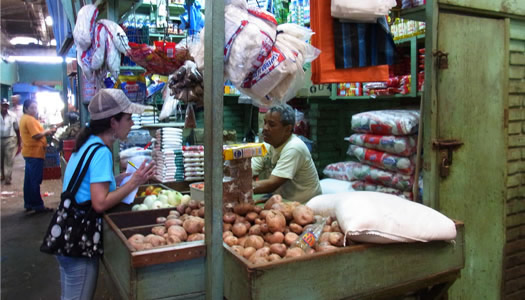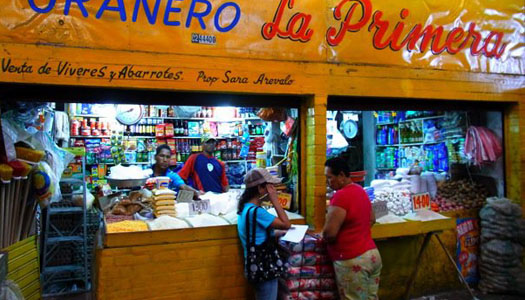Archive
Bazurto: Efficiency, Mobility and Food Security

2009- 2010 DUSP Cartagena Practicum - Bazurto: Efficiency, mobility, and food security
In fourteen two hour Practicum sessions and two weeks of field work on food supply and distribution in the Global South, Feeding Cities in the Global South: Challenges and Opportunities for Action in Cartagena this fall, eleven MIT graduate students and eleven UTB students (Universidad Tecnológica de Bolivar, Cartagena) were offered the opportunity to research and develop best practices for public markets in Latin America. Weeks nine and ten of the Practicum zero-in on the geography of the food chain supply for Bazurto, the urban, low-income marketplace of Cartagena, Colombia (where 80% of the city buys groceries and 60% of shoppers live at the poverty level). The program then culminates in an additional two-week fieldtrip in January 2010 to Cartagena, followed by three additional weeks of reflections and materials final production. During this trip students spent fifteen days blending results of prepared case studies with mapping and logistics indicators for marketplace efficiency developed by the eleven students from the Universidad Tecnológica de Bolivar (UTB). Additionally, MIT and UTB students worked together in the field, engaging leaders from the Cartagenean Vendors Association and local policy makers. With an eye towards creating effective urban food sustainability policy in the city of Cartagena, workshops and field-work will conclude with a student prepared multi-sector, interdisciplinary, multi-cultural, and transnational policy proposal for food security and public market efficiency. On January 25, 2010, at the UTB auditorium, participating MIT and UTB students delivered their policy proposal for more effective food supply and distribution in the Bazurto Marketplace to the City of Cartagena for implementation.
Aim and description of the Practicum: Feeding Cities in the Global South: Challenges and Opportunities for Action in Cartagena.
The purpose of this Practicum is to provide a context for understanding the challenges of urban food provisioning from a perspective of sustainability and social inclusion in cities of the global South. The Practicum will be specifically geared towards preparing students for direct participation in urban markets and food policy project intervention in Cartagena, Colombia. The overall objective of the project is to collaborate with government officials and academics in Cartagena to study the current food supply system with particular focus in the Bazurto Food Market plaza, identifying key challenges and opportunities, and developing policy recommendations. This Practicum will serve as an introduction to the critical issues in urban markets and food provisioning, considering the key elements of efficient, sustainable, and inclusive urban food systems: transport and logistics, land use and informal sector participation. The Practicum will draw on contemporary Latin America, as well as a wider set of historical and geographical experiences.

Instruction Team
- Ralph Gakenheimer, Professor of Urban Planning, Massachusetts Institute of Technology
- Edgar Blanco, Executive Director, MIT-CLI Alliance
- Alejandro Guarin, University of California, Researcher at FAO "Food markets in poor urban areas in Latin America,"
- Martha Bonilla, Former MIT Green Hub Global Program Coordinator
Knowledge Creation Opportunity
This Practicum is a great opportunity for knowledge creation because it examines urban sustainability and land use at the food market place level.
Specifically, the course and the field work aims to:
- Build on the strengths of inter-disciplinary and cross-cultural interaction to effectively confront community challenges related to food systems, with a particular view on transport and logistics, land use and the informal sector.
- Develop concrete, local-level proposals for "sustainable food policy development" in Cartagena's central Food Market (Bazurto) that can be presented to the community and relevant authorities and other organizations/stakeholders; and
- Incorporate the concepts of sustainability and social inclusion into the process of developing and evaluating these proposals, as well as their content.
Contact:
Martha Bonilla
mbp@mit.edu
